Charles E W Bean, Diaries, AWM38 3DRL 606/82/1 - July 1917 - Part 1
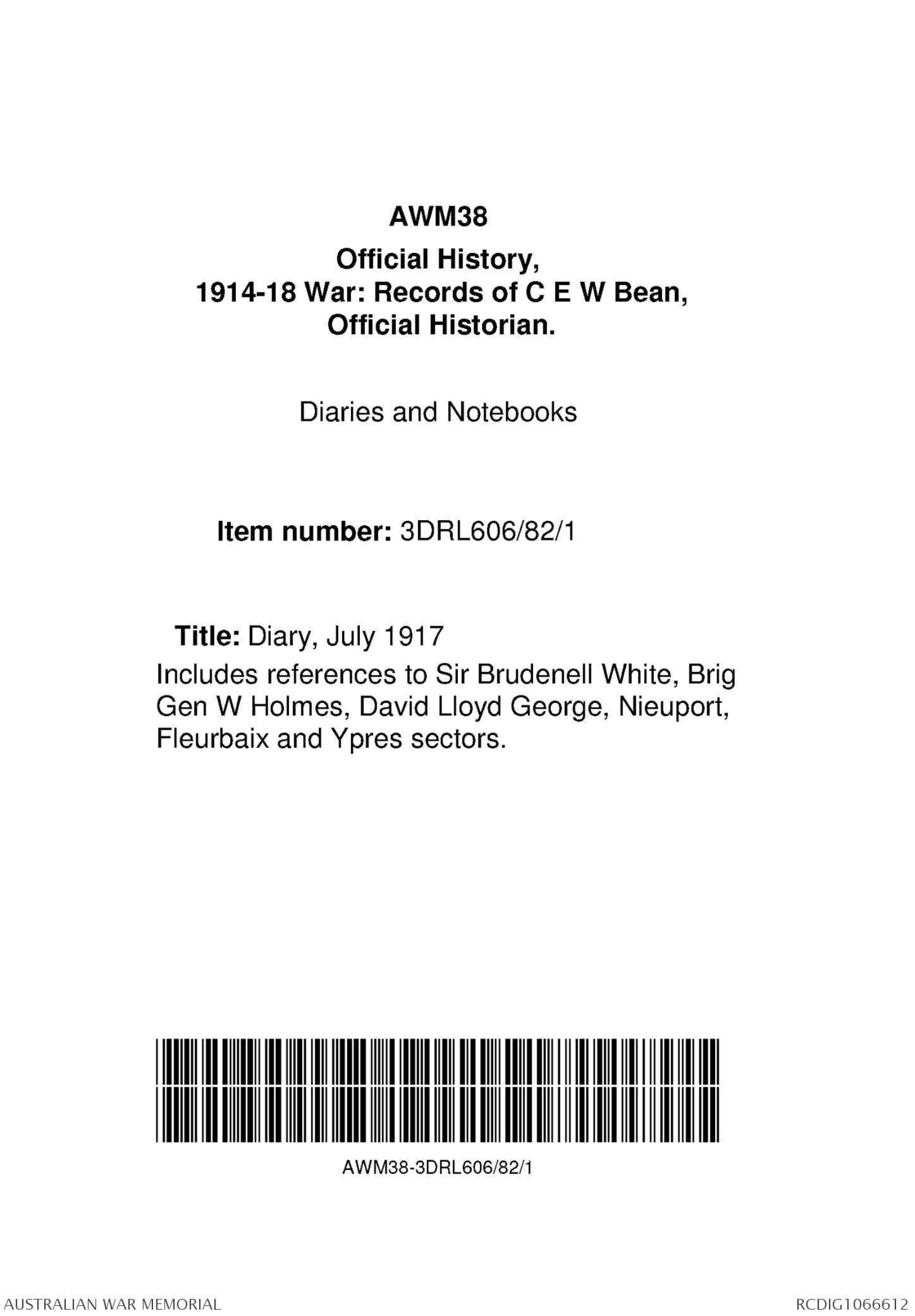
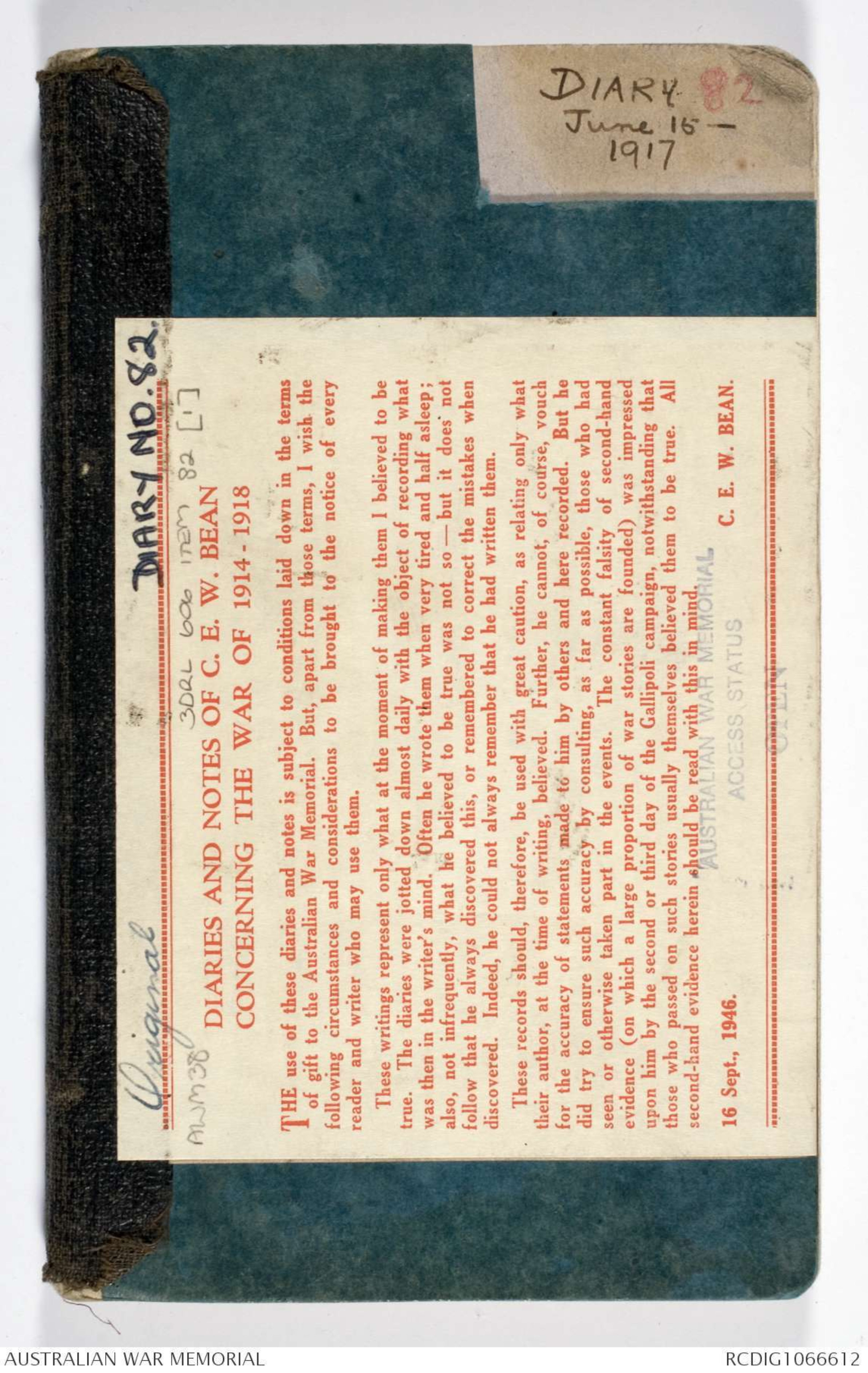

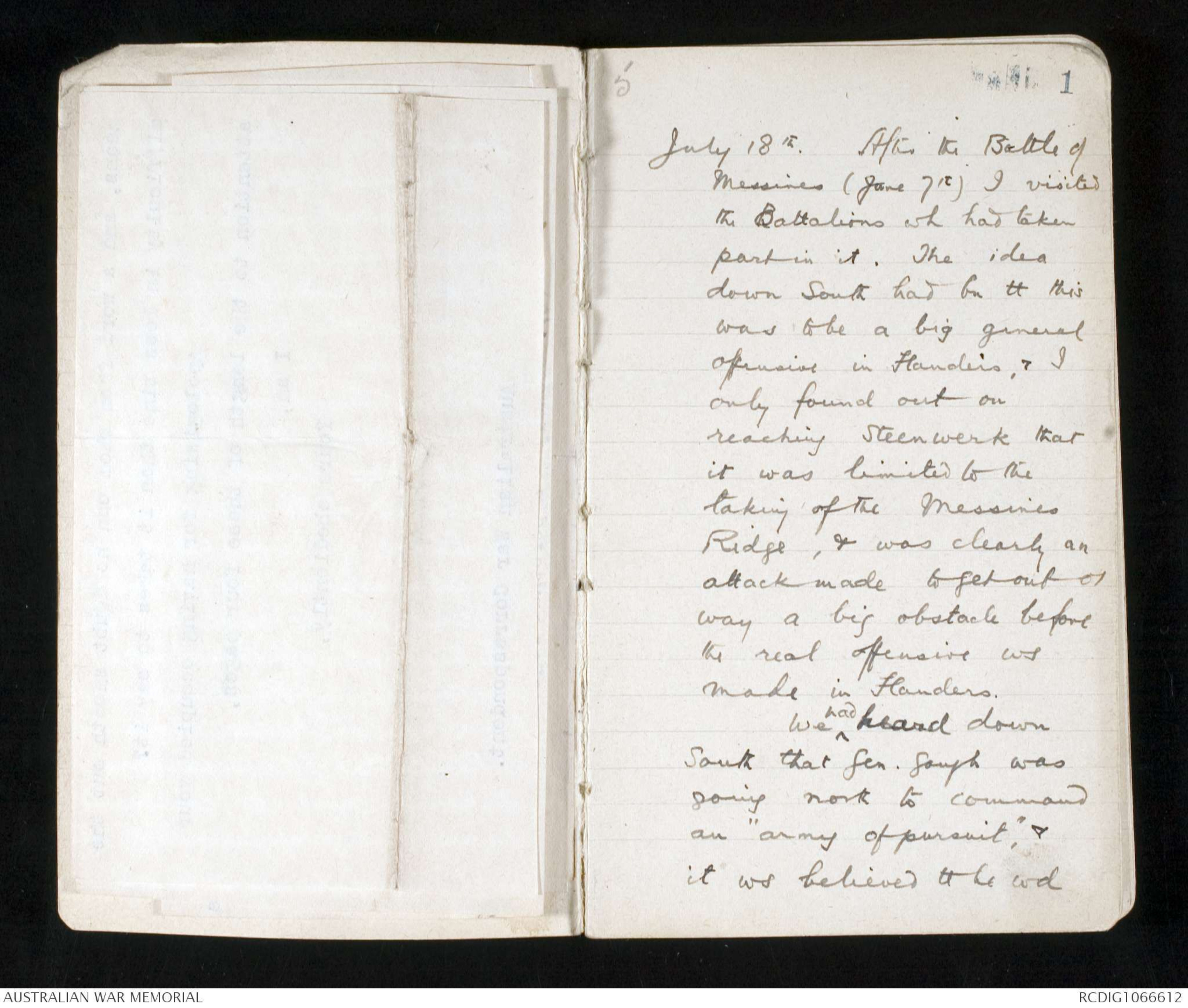
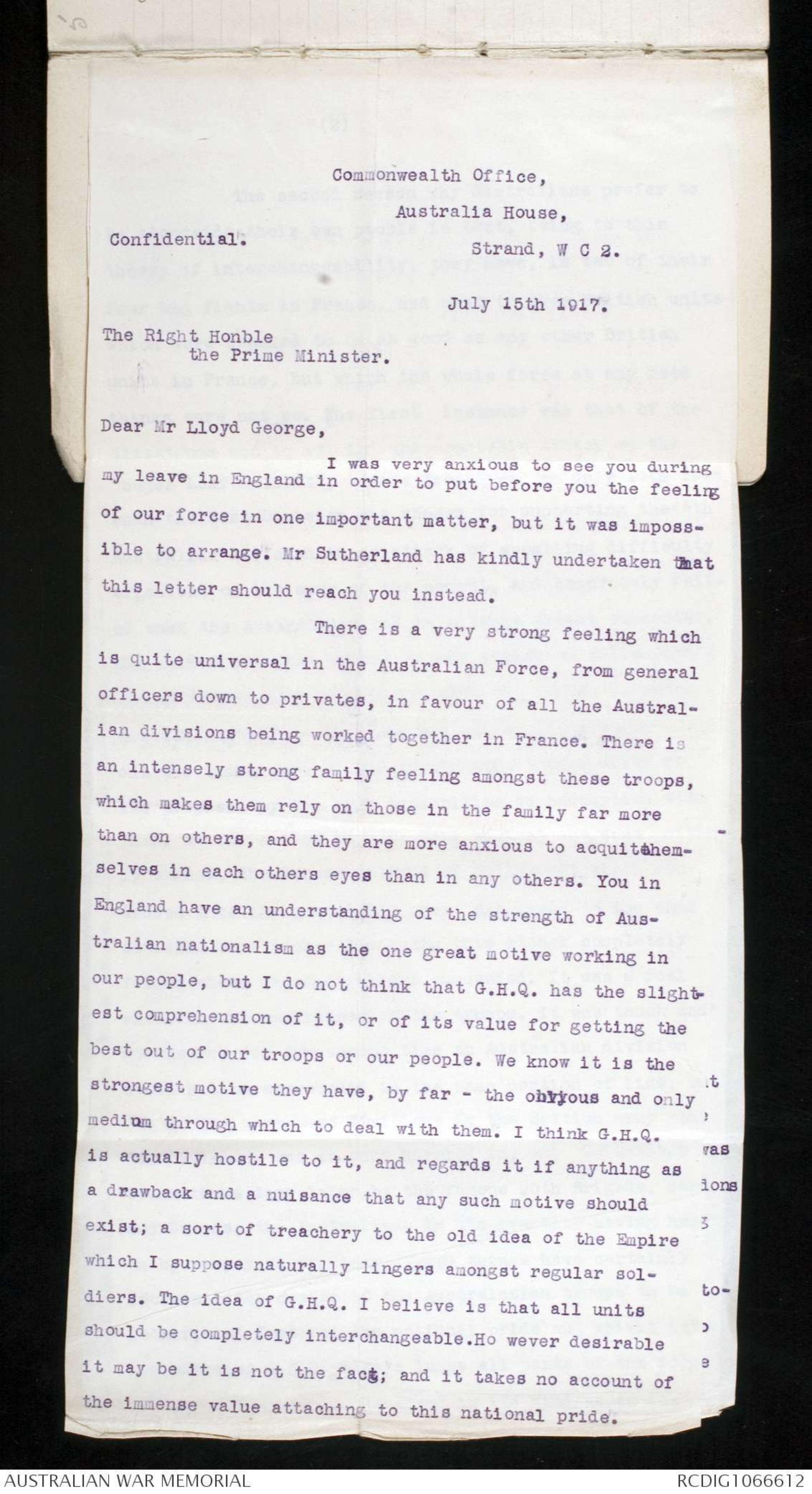
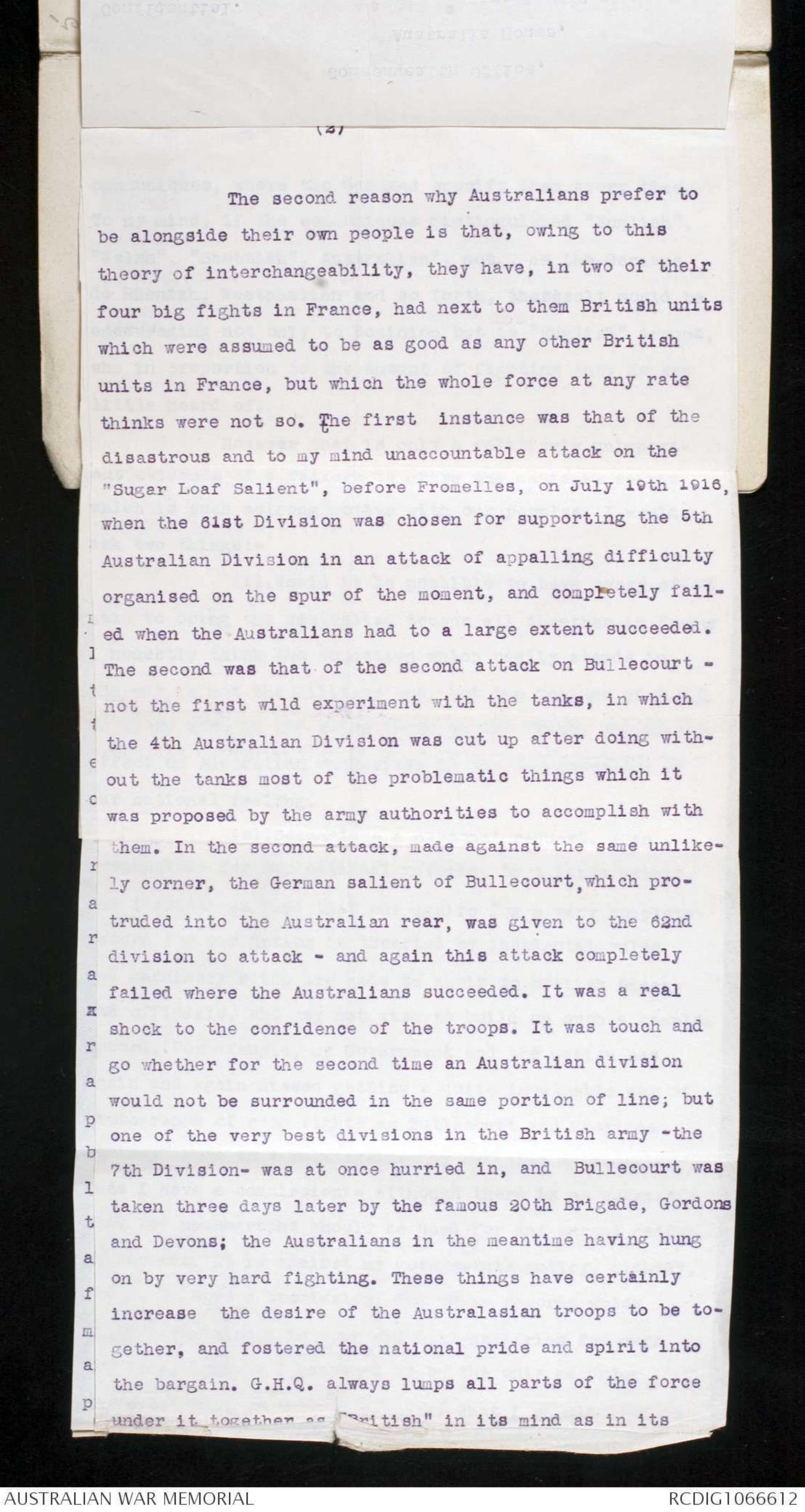
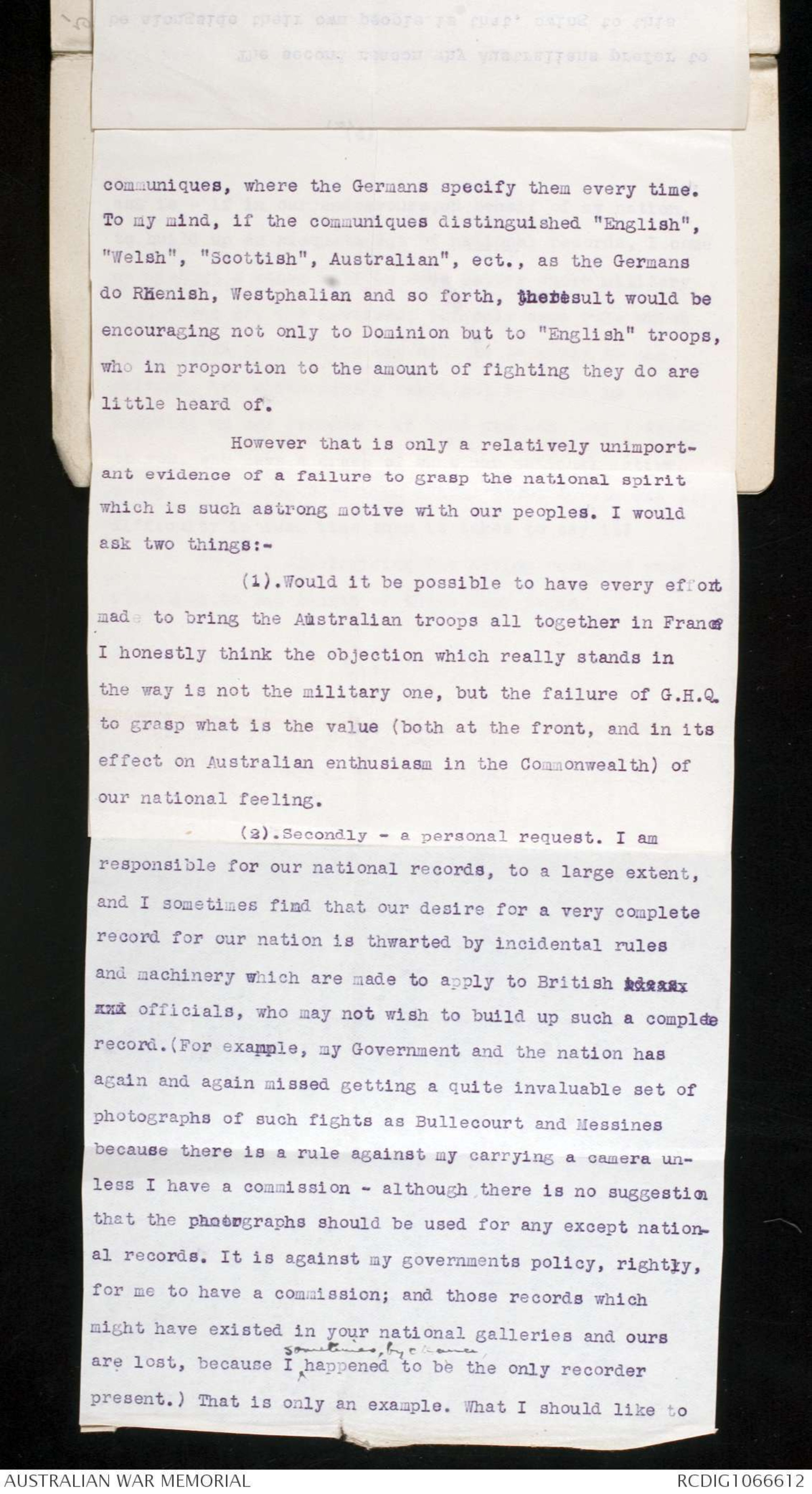
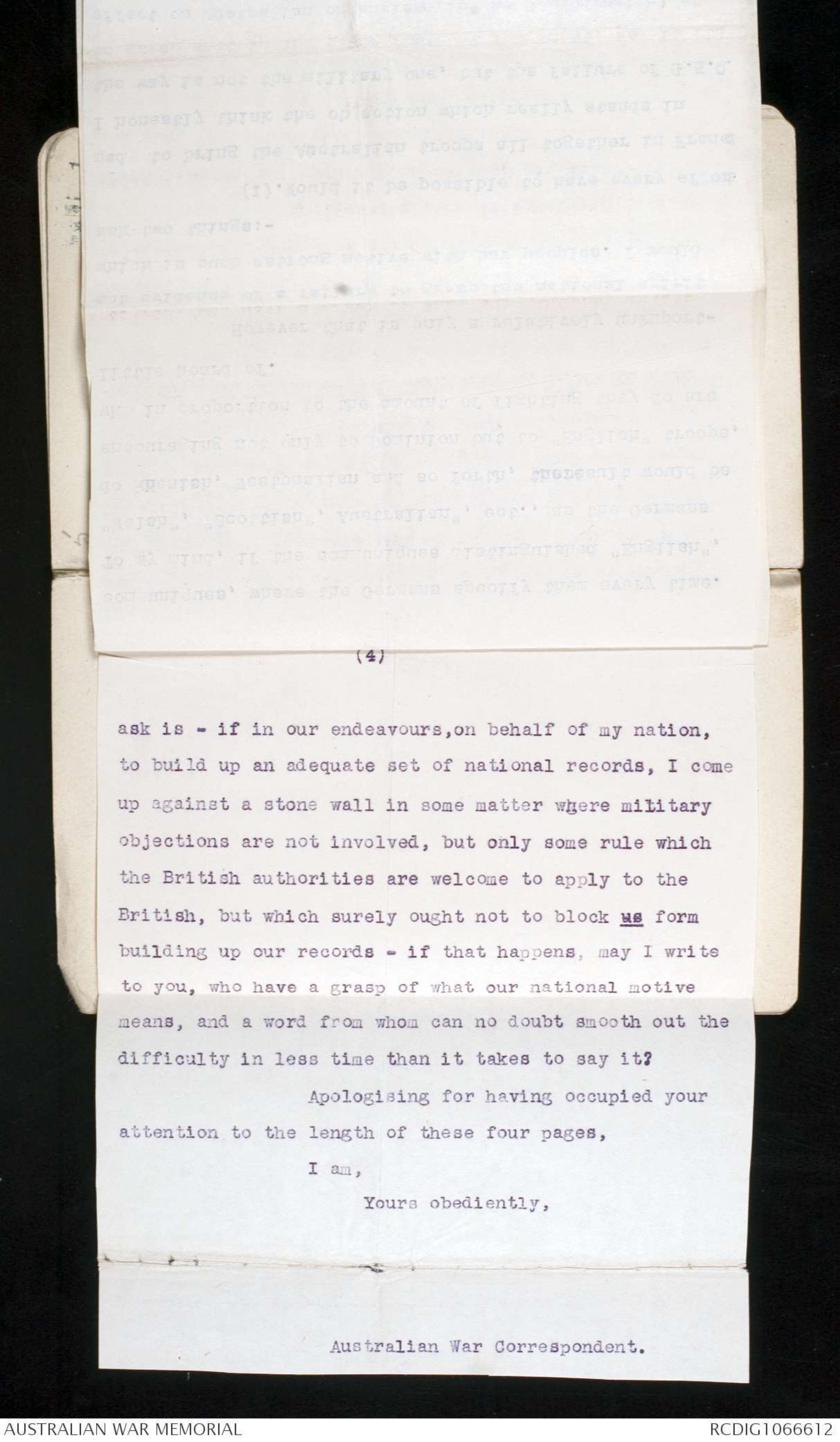
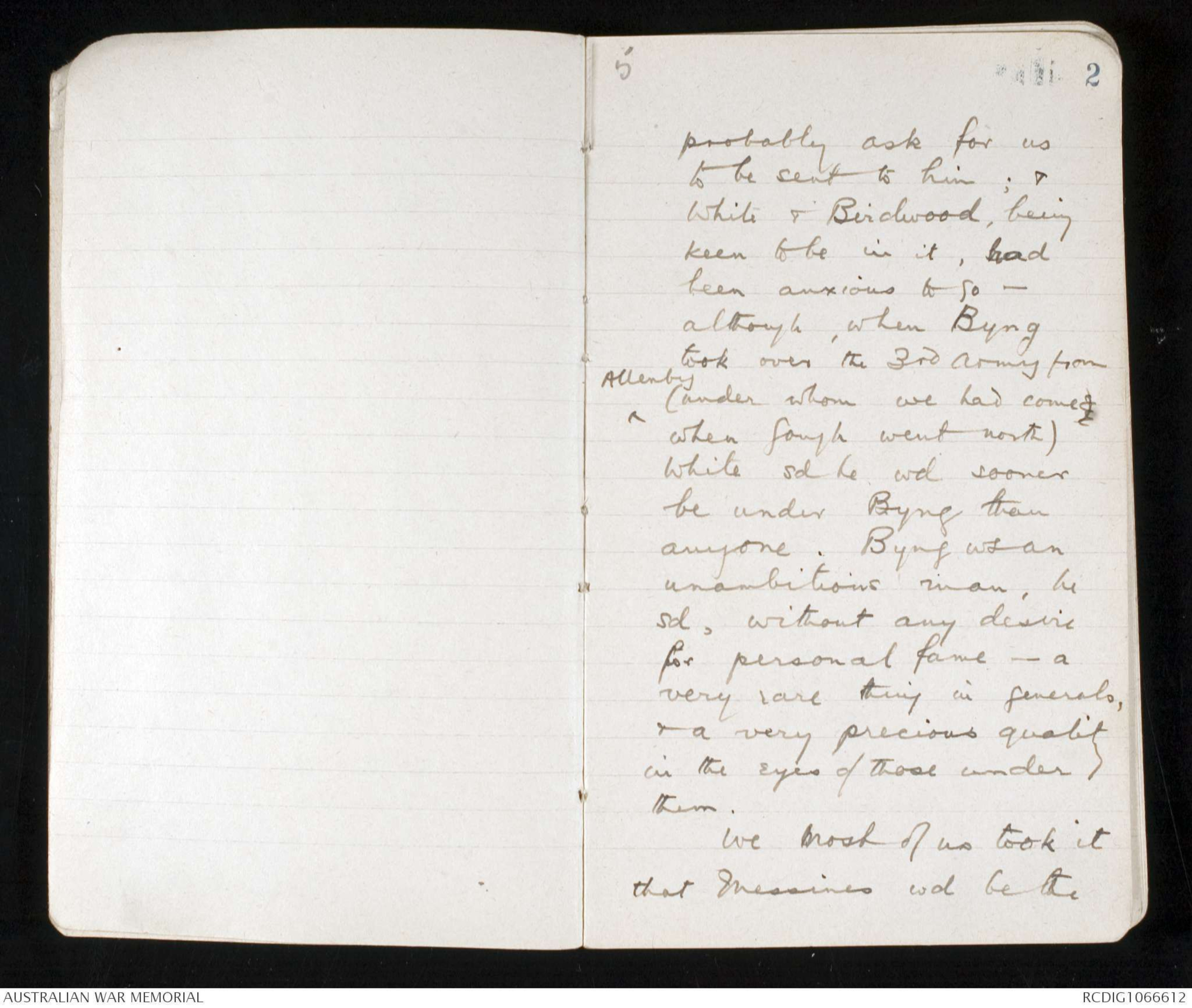
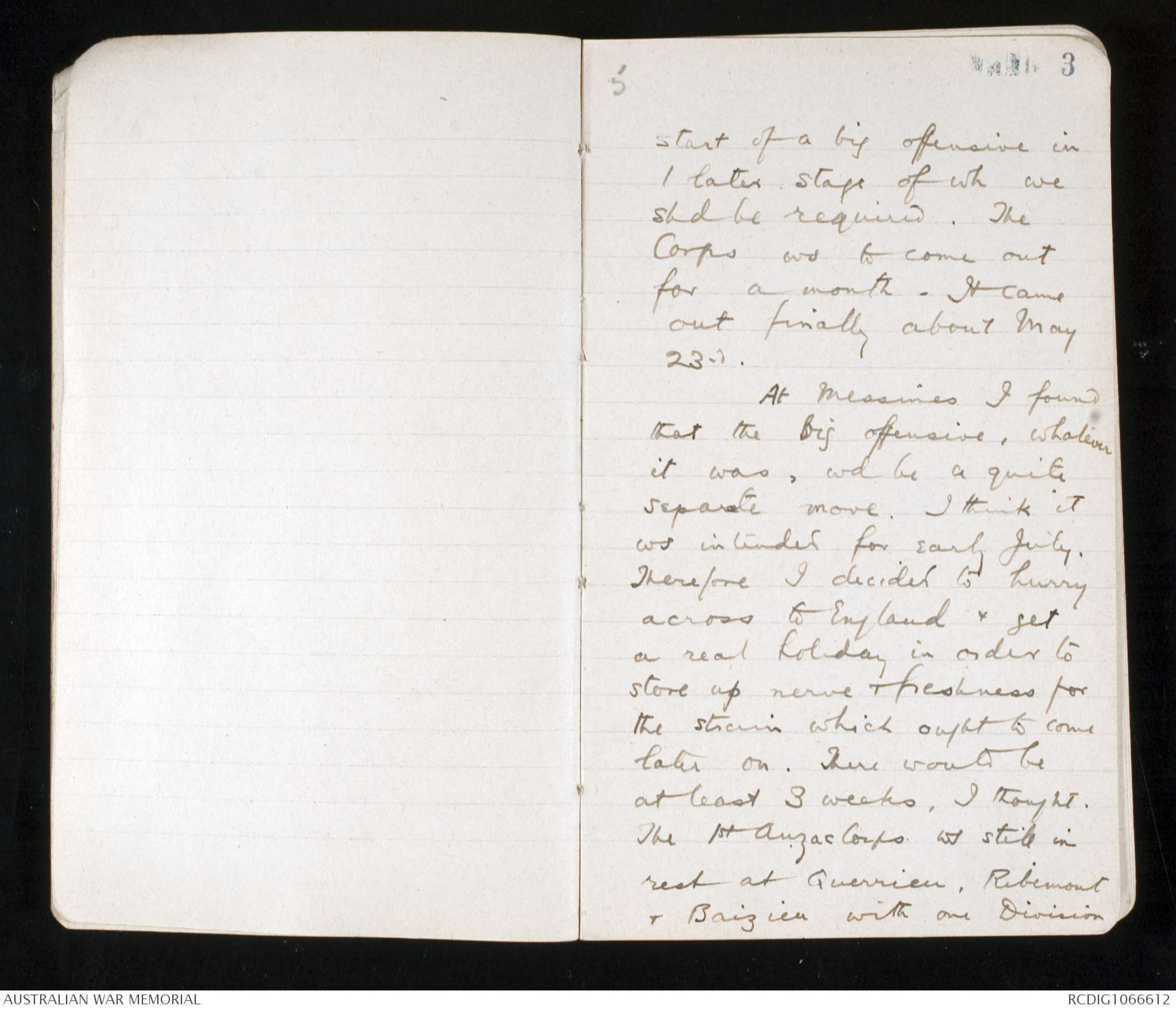
AWM38
Official History,
1914-18 War: Records of C E W Bean,
Official Historian.
Diaries and Notebooks
Item number: 3DRL606/82/1
Title: Diary, July 1917
Includes references to Sir Brudenell White, Brig
Gen W Holmes, David Lloyd George, Nieuport,
Fleurbaix and Ypres sectors.
AWM38-3DRL606/82/1
DIARY 82
June 15 -
1917
Original DIARY NO. 82.
AWM 38 3DRL 606 ITEM 82 [1]
DIARIES AND NOTES OF C.E.W. BEAN
CONCERNING THE WAR OF 1914 - 1918
THE use of these diaries and notes is subject to conditions laid down in the terms
of gift to the Australian War Memorial. But, apart from those terms, I wish the
following circumstances and considerations to be brought to the notice of every
reader and writer who may use them.
These writings represent only what at the moment of making them I believed to be
true. The diaries were jotted down almost daily with the object of recording what
was then in the writer's mind. Often he wrote them when very tired and half asleep;
also, not infrequently, what he believed to be true was not so – but it does not
follow that he always discovered this, or remembered to correct the mistakes when
discovered. Indeed, he could not always remember that he had written them.
These records should, therefore, be used with great caution, as relating only what
their author, at the time of writing, believed. Further, he cannot, of course, vouch
for the accuracy of statements made to him by others and here recorded. But he
did try to ensure such accuracy by consulting, as far as possible, those who had
seen or otherwise taken part in the events. The constant falsity of second-hand
evidence (on which a large proportion of war stories are founded) was impressed
upon him by the second or third day of the Gallipoli campaign, notwithstanding
those who passed on such stories usually themselves believed them to be true. All
second-hand evidence herein should be read with this in mind.
16 Sep., 1946. C.E.W. BEAN.
AUSTRALIAN WAR MEMORIAL
ACCESS STATUS
OPEN
31
DIARY 82
June 15 -
1917
5 1
July 18th. After the Battle of
Messines (June 7th) I visited
the Battalions wh had taken
part in it. The idea
down South had bn tt this
was to be a big general
offensive in Flanders, & I
only found out on
reaching Steenwerk that
it was limited to the
taking of the Messines
Ridge, & it was clearly an
attack made to get out o /
way a big obstacle before
the real offensive ws
made in Flanders.
We ^had heard down
South that Gen. Gough was
going north to command
an "army of pursuit," &
it ws believed tt he wd
Commonwealth Office,
Australia House,
Strand, W C 2.
Confidential.
July 15th 1917.
The Right Honble
the Prime Minister.
Dear Mr Lloyd George,
I was very anxious to see you during
my leave in England in order to put before you the feeling
of our force in one important matter, but it was impossible
to arrange. Mr Sutherland has kindly undertaken that
this letter should reach you instead.
There is a strong feeling which
is quite universal in the Australian Force, from general
officers down to privates, in favour of all the Australian
divisions being worked together in France. There is
an intensely strong family feeling amongst these troops,
which makes them rely on those in the family far more
than on others, and they are more anxious to acquitthemselves
in each others eyes than in any others. You in
England have an understanding of the strength of Australian
nationalism as the one great motive working in
our people, but I do not think that G.H.Q. has the slightest
comprehension of it, or of its value for getting the
best out of our troops or our people. We know it is the
strongest motive they have, by far - the obvious and only
medium through which to deal with them. I think G.H.Q.
is actually hostile to it, and regards it if anything as
a drawback and a nuisance that any such motive should
exist; a sort of treachery to the old idea of the Empire
which I suppose naturally lingers amongst regular soldiers.
The idea of G.H.Q. I believe is that all units
should be completely interchangeable. Ho wever desirable
it may be it is not the fact; and it takes no account of
the immense value attaching to this national pride.
(2)
The second reason why Australians prefer to
be alongside their own people is that, owing to this
theory of interchangeability, they have, in two of their
four big fights in France, had next to them British units
which were assumed to be as good as any other British
units in France, but which the whole force at any rate
thinks were not so. The first instance was that of the
disastrous and to my mind unaccountable attack on the
"Sugar Loaf Salient", before Fromelles, on July 19th 1916,
when the 61st Division was chosen for supporting the 5th
Australian Division in an attack of appalling difficulty
organised on the spur of the moment, and completely failed
when the Australians had to a large extent succeeded.
The second was that of the second attack on Bullecourt -
not the first wild experiment with the tanks, in which
the 4th Australian Division was cut up after doing without
the tanks most of the problematic things which it
was proposed by the army authorities to accomplish with
them. In the second attack, made against the same unlikely
corner, the German salient of Bullecourt, which protruded
into the Australian rear, was given to the 62nd
division to attack - and again this attack completely
failed where the Australians succeeded. It was a real
shock to the confidence of the troops. It was touch and
go whether for the second time an Australian division
would not be surrounded in the same portion of line; but
one of the very best divisions in the British army - the
7th Division- was at once hurried in, and Bullecourt was
taken three days later by the famous 20th Brigade, Gordons
and Devons; the Australians in the meantime having hung
on by very hard fighting. These things have certainly
increase the desire of the Australasian troops to be together,
and fostered the national pride and spirit into
the bargain. G.H.Q. always lumps all parts of the force
under it together as "British" in its mind as in its
communiques, where the Germans specify them every time.
To my mind, if the communiques distinguished "English",
"Welsh", "Scottish", Australian", ect., as the Germans
do Rhenish, Westphalian and so forth, theresult would be
encouraging not only to Dominion but to "English" troops,
who in proportion to the amount of fighting they do are
little heard of.
However that is only a relatively unimportant
evidence of a failure to grasp the national spirit
which is such astrong motive with our peoples. I would
ask two things:-
(1). Would it be possible to have every effort
made to bring the Australian troops all together in France?
I honestly think the objection which really stands in
the way is not the military one, but the failure of G.H.Q.
to grasp what is the value (both at the front, and in its
effect on Australian enthusiasm in the Commonwealth) of
our national feeling.
(2). Secondly - a personal request. I am
responsible for our national records, to a large extent,
and I sometimes find that our desire for a very complete
record for our nation is thwarted by incidental rules
and machinery which are made to apply to British ideasand officials, who may not wish to build up such a complete
record. (For example, my Government and the nation has
again and again missed getting a quite invaluable set of
photographs of such fights as Bullecourt and Messines
because there is a rule against my carrying a camera unless
I have a commission - although there is no suggestion
that the photographs should be used for any except national
records. It is against my governments policy, rightly,
for me to have a commission; and those records which
might have existed in your national galleries and ours
are lost, because I ^sometimes, by chance happened to be the only recorder
present.) That is only an example. What I should like to
(4)
ask is - if in our endeavours, on behalf of my nation,
to build up an adequate set of national records, I come
up against a stone wall in some matter where military
objections are not involved, but only some rule which
the British authorities are welcome to apply to the
British, but which surely ought not to block us form
building up our records - if that happens may I write
to you, who have a grasp of what our national motive
means, and a word from whom can no doubt smooth out the
difficulty in less time than it takes to say it?
Apologising for having occupied your
attention to the length of these four pages,
I am,
Yours obediently,
Australian War Correspondent.
5 2
probably ask for us
to be sent to him; &
White & Birdwood, being
keen to be in it, had
been anxious to go -
although, when Byng
took over the 3rd Army from
^Allenby (under whom we had come)
when Gough went north)
White sd he wd sooner
be under Byng than
anyone. Byng ws an
unambitious man, he
sd, without any desire
for personal fame - a
very rare thing in generals,
& a very precious quality
in the eyes of those under
them.
We most of us took it
that Messines wd be the
5 3
start of a big offensive in
/ later stage of wh we
shd be required. The
Corps ws to come out
for a month. It came
out finally about May
23rd.
At Messines I found
that the big offensive, whatever
it was, wd be a quite
separate move. I think it
ws intended for early July.
Therefore I decided to hurry
across to England & get
a real holiday in order to
store up nerve & freshness for
the strain which ought to come
later on. There would be
at least 3 weeks, I thought.
The 1st Anzac Corps ws still in
rest at Querrien, Ribemont
& Baizien with one Division
 Deb Parkinson
Deb ParkinsonThis transcription item is now locked to you for editing. To release the lock either Save your changes or Cancel.
This lock will be automatically released after 60 minutes of inactivity.